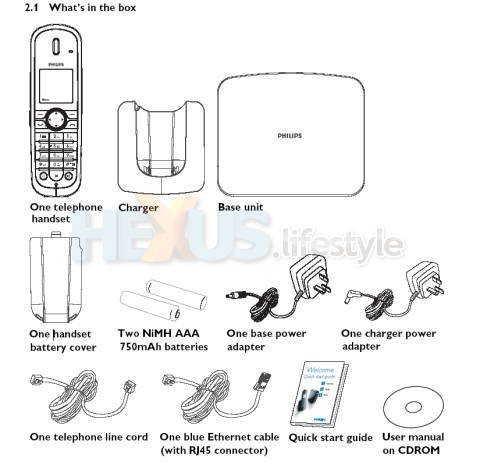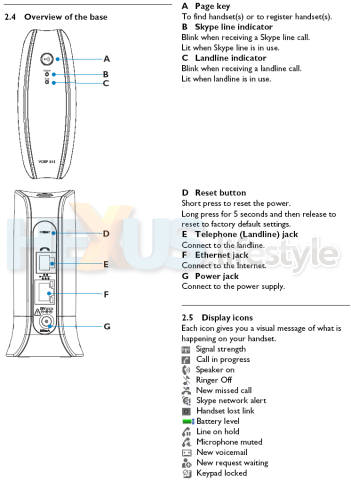Tech specs in a gripe-free zone
One problem with new toys that use rechargeable batteries is that you've got to wait hours for them to come up to power before you can start playing with them.
Happily, though, the two NiMH rechargeable batteries included in pack were partially charged (thanks Marco!), so we didn't have to contain our excitement for the 14 hours that the guide said we'd need to wait first time round.
But you, dear reader, probably won't be so lucky and really should follow that advice to the letter.
Everything you need to get going is included and the initial cable connections are ultra simple.
The box contents are:
* The phone itself
* Two NiMH (750mAh) AAA-size rechargeable batteries
* The battery cover for the phone (this is not attached, so fitting the batteries is a doddle)
* A small charging cradle for the phone
* A base-station that connects to the phone line and your network router - yes you must have a router and an internet connection to use Skype
* Two plug-mounted mains adaptors - one for the base-station and another for the phone's charging cradle
* An Ethernet cable (to connect the base-station to your router)
* A phone cable (along with an adaptor so it fits a BT socket - not show in the pic below),
* The quick-start guide
* The CD with PDF manuals
* A voucher giving you 120-minutes of free SkypeOut calls and 12 months free Skype voice-mail (also not shown)
* Two NiMH (750mAh) AAA-size rechargeable batteries
* The battery cover for the phone (this is not attached, so fitting the batteries is a doddle)
* A small charging cradle for the phone
* A base-station that connects to the phone line and your network router - yes you must have a router and an internet connection to use Skype
* Two plug-mounted mains adaptors - one for the base-station and another for the phone's charging cradle
* An Ethernet cable (to connect the base-station to your router)
* A phone cable (along with an adaptor so it fits a BT socket - not show in the pic below),
* The quick-start guide
* The CD with PDF manuals
* A voucher giving you 120-minutes of free SkypeOut calls and 12 months free Skype voice-mail (also not shown)
Lifted from the PDF manual (click
for larger image)
A nice touch - and necessary in our view because of the different power requirements of the base-station and charger - is that it wouldn't be possible (without resorting to extreme force) to connect either mains adaptor into the wrong device, simply because their output plugs are of different sizes.
Specs - as quoted on Philips' web site - include:
Picture/Display
Backlight : yes
Backlight colour : White
Display colours : 65000
Main display resolution : 128x128 pixel
Main display technology : CSTN
Sound
Handset ringers : Polyphonic
Handset Volume Control : 5-level earpiece and loudspeaker volume control
Number of melodies : 5 Std and 10 polyphonic
Ring profiles : Landline/Internet distinction
Convenience
Backlit keypad : Yes (green)
Base station keys : Paging key
Call management : Call on hold, Call Transfer, Call waiting, Caller ID, Message Waiting, Microphone mute
Ease of Use : Graphical user interface, Keypad lock, Menu control
Handset keys : Two softkeys, Four-way navigation key, Dialling keypad, Hang-up, Line, Loudspeaker
Multi base capability : Up to 4 bases
Multi handset capability : Up to 4 handsets
Signal strength indication : yes
Speakerphone-Talk hands-free : Yes
User interface : Skype on LED
Connectivity
Headset : Via Jack Connector (Handset)
Memory Capacity
Name & number phonebook : 500 Skype entries
Network Features
Antenna : Integrated on base, Integrated on handset
Dialling : Pulse, Tone
VoIP Client Compatibility
Fully Integrated with Skype : Yes
Skype Certified : Yes
Softphone compatibility
Direct call from contacts list : Yes
Display contacts list status : Yes
Edit user status on the phone : Yes
Add new contacts from handset : Yes
System Requirements
Internet connection : Broadband access through Modem, router or switch/hub
Power
Battery capacity : 750 mAh
Battery type : AAA NiMH
Battery type : Rechargeable
Mains power : AC 220-240V - 50Hz
Number of batteries : 2
Standby time : Up to 120 hours
Talk time : Up to 12 hours
Oh, and here's another lift from the manual, showing stuff
like socketry and indicator lights on the
base-station and the display icons on the handset.Backlight : yes
Backlight colour : White
Display colours : 65000
Main display resolution : 128x128 pixel
Main display technology : CSTN
Sound
Handset ringers : Polyphonic
Handset Volume Control : 5-level earpiece and loudspeaker volume control
Number of melodies : 5 Std and 10 polyphonic
Ring profiles : Landline/Internet distinction
Convenience
Backlit keypad : Yes (green)
Base station keys : Paging key
Call management : Call on hold, Call Transfer, Call waiting, Caller ID, Message Waiting, Microphone mute
Ease of Use : Graphical user interface, Keypad lock, Menu control
Handset keys : Two softkeys, Four-way navigation key, Dialling keypad, Hang-up, Line, Loudspeaker
Multi base capability : Up to 4 bases
Multi handset capability : Up to 4 handsets
Signal strength indication : yes
Speakerphone-Talk hands-free : Yes
User interface : Skype on LED
Connectivity
Headset : Via Jack Connector (Handset)
Memory Capacity
Name & number phonebook : 500 Skype entries
Network Features
Antenna : Integrated on base, Integrated on handset
Dialling : Pulse, Tone
VoIP Client Compatibility
Fully Integrated with Skype : Yes
Skype Certified : Yes
Softphone compatibility
Direct call from contacts list : Yes
Display contacts list status : Yes
Edit user status on the phone : Yes
Add new contacts from handset : Yes
System Requirements
Internet connection : Broadband access through Modem, router or switch/hub
Power
Battery capacity : 750 mAh
Battery type : AAA NiMH
Battery type : Rechargeable
Mains power : AC 220-240V - 50Hz
Number of batteries : 2
Standby time : Up to 120 hours
Talk time : Up to 12 hours
Click for larger image
So, in theory, the VOIP841 is offering lots and lots of good stuff. But how well do theory and real-world experience coincide? Find out on page three...




